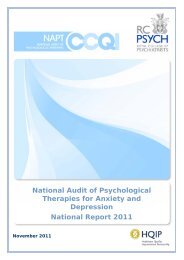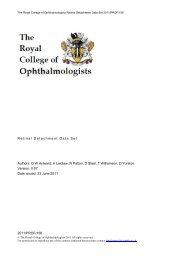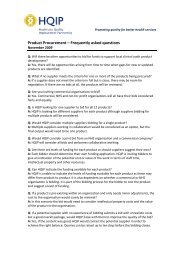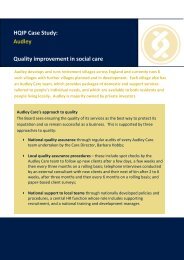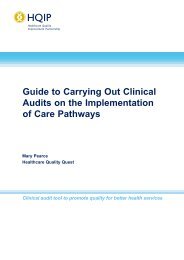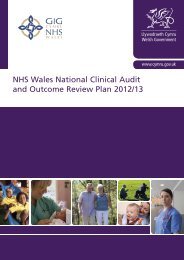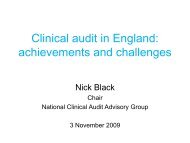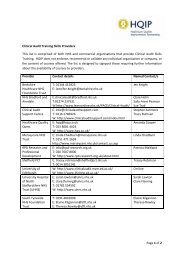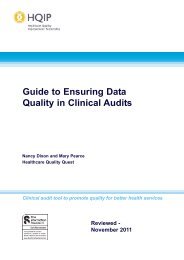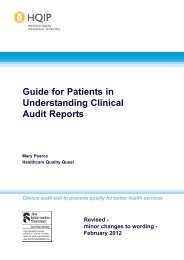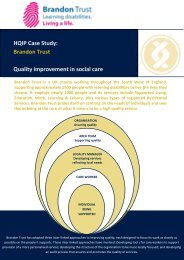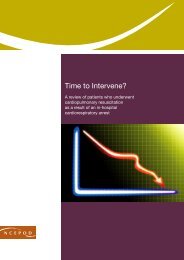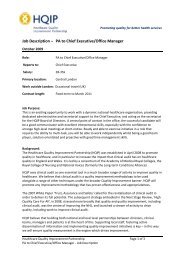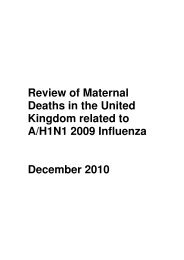issues or problems within the EMAS care processes enabling usto put in place steps to improve our service to patients.This practice has led to several joint educational initiativesbeing developed. It was noted that MIs weren’t always beingidentified from ECGs and therefore a series of ECG recognitionworkshops for ambulance clinicians were developed by aparamedic who is also one of the Trust’s quality improvementleads. These are co-delivered by a consultant cardiacnurse from one of the local hospital trusts. The workshopsemphasise MI recognition, identification of reciprocal changesand the need to keep on-scene times to a minimum to ensurethe patient has quick access to appropriate interventions.Information leaflets were also produced which can be given topatients’ relatives. One primary PCI centre contacted the Trustto commend paramedic Claire Hill on her quick thinking andskilled treatment which had certainly saved the patient’s lifeand led to an extremely good prognosis; Claire commented,”Clinical decision making is a vital element of the paramedicrole, I feel that the excellent foundations laid down by AlunRoebuck and Mark Hall during the ECG cardiac workshops,provided me the confidence and knowledge to ‘think out of thebox’ whilst making a clinical decision that was ‘the correctone’ and, more importantly, right for the patient. Additionally,being able to provide a primary PCI information leaflet tothe patient’s anxious daughter enabled me to leave scenepromptly, knowing that the daughter had a point of contact.”A project aimed at reducing on-scene times for chestpain patients is also in progress in one division of EMAS.Ambulance clinicians attend quality improvement workshopsand use process mapping and cause and effect diagrams toidentify causes of on-scene delays and solutions for reducingor eliminating those delays. Interventions will be developed,trialled and measured to see whether they do reduce timeon scene. A spread process will be used to trial the mosteffective interventions in other areas of the Trust to seewhether the improvements are reproduced. The intention willbe to establish the most effective interventions into the careprocesses across the whole trust.These are just some of the positive effects on patient carewhich involvement in MINAP is having in EMAS.5. Reducing the delay to reperfusion by calling999 - Primary Care Acute Chest Pain Awareness<strong>Project</strong> in South West WalesAlison Turner - MINAP/Call to Reperfusion ImprovementFacilitator, South Wales Cardiac NetworkMarc Thomas - Information, Communications & <strong>Project</strong>Manager,South Wales Cardiac NetworkThe Primary Care Acute Chest Pain Awareness <strong>Project</strong>addressed the evidence demonstrated by analysis of theMINAP database that people in Wales are more likely thantheir English counterparts to call their GP than dial 999directly. In conjunction with the British Heart Foundation,resources were developed to support a systematic approachto raising awareness, in both primary care and the public, ofthe need to respond to chest pain by dialling 999 rather thancalling surgeries by telephone or attending in person.Questionnaires performed before and after educationalsessions in primary care and the provision of printedinformation, demonstrated that there was an increase inthose STEMI patients contacting 999 directly (8.7%) with acorresponding reduction in those being admitted after seeingtheir GP.Data for a similar region in England and a neighbouringregion in Wales were compared. The greatest improvementwas demonstrated where both resources and primary careeducation had been provided.Alun Roebuck and Paramedic Hannah Coppack studying anECG during one of the workshops.Concerns that the project would create a significantly higherworkload for the Welsh Ambulance Service were allayedby the analysis of all chest pain calls pre and post projectimplementation. There was no increase in these calls, leadingto the conclusion that the calls would have been made to the999 system eventually; but were now being made in a moretimely way.86 MINAP How the NHS cares for patients with heart attack
The British Heart Foundation is a registered charity in England and Wales (225971) and in Scotland (SC039426)The project started when thrombolysis was the first linetreatment for STEMI patients in South West Wales. However,this approach to accessing reperfusion is just as applicable toprimary PCI where patients are conveyed straight to the tertiarycentre. Both treatment options have better outcomes the earlierthe intervention; reducing access delays are important.The resources developed include (Figure 23):Posters for public places, depicting signs and symptoms ofacute chest pain and what to doConcertina leaflets with a similar message, for use inrehabilitation / chronic disease management clinics, or anypublic eventA flow chart providing a systematic approach for nonclinicalstaff to signpost those complaining of acute chestpain to the 999 system (both presenting over the telephonerequesting a GP appointment or in person presenting to theGP surgery)A flow chart providing a systematic approach for clinicalstaff, who may not regularly deal with acute chest painpresentations, to enable a systematic approach.These resources can be downloaded from the South WalesCardiac Network website along with a generic PowerPointpresentation that can be adapted to suit local use.For further information please contact either Alison Turneralison.turner@wales.nhs.uk or Marc Thomas marc.thomas@wales.nhs.ukThe South Wales Cardiac Network project team would like tothank the following for their support:British Heart FoundationWelsh Ambulance Service TrustNorth East England Cardiovascular NetworkFigure 23. Posters, leaflets and flowcharts to raise awarenessof the need to respond to chest pain by dialling 999heart attack?know these symptomsless common symptomsIt is important to know that women are morelikely to have these less common symptoms.However, they may also experience the moretypical symptomsheart attacks...the facts– every year approximately 90,000 people diefrom heart attacks - that’s around 245 per day– around a third of heart attack patients diebefore reaching hospital– you are three times more likely to survive aheart attack if you call the emergency servicesimmediately and receive medical help in thefirst hour than if you waitheart attack?know these symptomsturn doubt into actionand call 999– a dull pain, ache or heavy feeling in the chest– a mild discomfort in the chest that makesAlthough the most common symptoms of a heart attackyou feel generally unwellare widely known, they vary from person to person.– a pain like indigestion which may spread However, not everyone having a heart attack has theseto the lower back and stomachtypical symptoms. Some people may only get one of thesesymptoms; some people may even get no symptoms at all.– feeling light-headed and dizzy, as well ashaving chest pain– jaw and neck ache, as well as having chest pain– aching in your jaw, neck or shoulders, usuallyas well as having chest pain.think quick... act fastturn doubt into actionand call 999.When someone has a heart attack it is vitalthat they act really quickly.Calling 999 immediately for an ambulance means you canget emergency treatment as soon as possible. This couldinclude clotbusting drugs – to restore the blood supplyto the heart – which should be given within minutesafter symptoms start.– central chest pain or tightness, which doesn’tMany people delay calling for an ambulance becausego away. This is often described as crushing orthey don’t recognise the symptoms... or because theyconstricting or like a tight band. The pain maydon’t believe that a heart attack may be happening.spread to the left arm, right arm, shoulders or jawIt is vital that people recognise the symptoms of a heart – feeling sick or being sickattack and take the right action quickly. If you suspect– shortness of breaththat you or someone else is having a heart attack youmust call 999 immediately.– sweating, although the skin may feel coldto the touch– reduced level of consciousness; or unconsciousness.don’t forget, doubt kills.so turn doubt into action –it could save your heartand your life.common symptomspain or discomfort in thechest that doesn’t go awayor may spread to neckand jawthink quick… act fastcall 999 immediatelythe pain may spread to theleft or right armyou may feel sick orshort of breathBHF_Symptoms Posters WALES_AW.indd 1 26/1/09 11:54:05The British Heart Foundation is a registered charity in England and Wales (225971) and in Scotland (SC039426)HistoryPatient complainsof acute chest painFurther HistoryCall emergencyservices andupgrade call to 999ExaminationDiagnosisof acutecoronary eventAcute Chest PainPatient ManagementAcute Chest Pain Management(Clinical) Patient complains of chest pain ordiscomfort and/or has collapsedPatient maycomplain of associatedsymptoms** AssociatedSymptoms• Shortness of breath• Nausea/vomiting• Sweating• Feeling light-headed• PallorTelephoneAsk Patient:Somebody is withIf patient is alone* Risk Factors the patient• Character/severity/location/radiation of pain• Smoking• Time of onset• Hyperlipidaemia• Is pain continuous?• Hypertension• Factors relieving pain• Diabetes• Past history of similar pain• Existing CHD• Risk Factors* • Ask for brief details • Family history of CHD• Related to activity (name, or exercise DOB, address) • Recent • cocaine Ask use for brief details• Is pain related to • trauma/injury? Note date/timeof patient (name, DOB,• Transfer the call toaddress)a doctor or nurse• Ask caller to redial 999Examination immediately• General appearance - pallor/clammy/cyanosedExamination• Vital signs – Pulse/BP/should not delayResp. rate/O2 Saturation/JVPtransport of patient• Auscultate chest•Dial 999 and ask to secondary careAbdominal examination – forsuspected aneurysm for ambulance forInform doctor• ECGchest pain to attendof the callat patient’s addressIn practiceCall 999 then alertdoctor or nurseImmediately• Sit patient down• Reassure help ison the way• Stay with patientuntil help arrivesEmergencyTreatmentSupport Equipment(where available):• Aspirin 300mgRemember:• Oxygen• Defibrillator• GTN sprayFor every minute • delay Oxygen in thrombolytic treatment 11 days survival is lost• Opiate analgesia/antiemetic• Suction• If not already called, call ambulance.• Airway• Bag Valve MaskThe British Heart Foundation’s Chest Pain Programmeaims to raise awareness of the symptoms Concertina_leaflet_WALES_AW.indd of a heart1 26/1/09 11:52:44attack and what action to take when someone thinksthey are having one. For information on the ChestPain Programme, email chestpain@bhf.org.ukRemember:For every minute delay in thrombolytic treatment 11 days survival is lostRegistered Charity Number 225971Registered Charity Number 225971Concertina_leaflet_WALES_AW.indd 2 26/1/09 11:52:47MINAP Eleventh Public Report 201287
- Page 1 and 2:
Myocardial IschaemiaNational Audit
- Page 3 and 4:
Myocardial Ischaemia National Audit
- Page 5 and 6:
ForewordThe annual MINAP Report, no
- Page 7 and 8:
Patients who received thrombolytic
- Page 9 and 10:
considering such factors as the age
- Page 11 and 12:
egarding previous medical history.
- Page 13 and 14:
3. Improving quality,improving outc
- Page 15 and 16:
is an acute heart failure syndrome
- Page 17 and 18:
Alan KeysMINAP Steering Group patie
- Page 19 and 20:
Figure 7. Patients admitted with a
- Page 21 and 22:
Figure 11. Percentage of patients w
- Page 23 and 24:
transfers require a significant amo
- Page 25 and 26:
Table 8 shows the performance of th
- Page 27 and 28:
This year we report on the interval
- Page 29 and 30:
Conquest Hospital, St Leonards onSe
- Page 31 and 32:
Royal Derby Hospital, Derby 62 89%
- Page 33 and 34:
“During times of financial constr
- Page 35 and 36: Broomfield Hospital, Chelmsford 0 0
- Page 37 and 38: Leighton Hospital, Crewe 43 86% 49
- Page 39 and 40: Royal Preston Hospital, Preston 48
- Page 41 and 42: Wycombe Hospital, High Wycombe 11 1
- Page 43 and 44: “I know that MINAP data has been
- Page 45 and 46: Cheltenham General Hospital, Chelte
- Page 47 and 48: Manchester Royal Infirmary, Manches
- Page 49 and 50: Salford Royal Hospital, Manchester
- Page 51 and 52: “MINAP, and its long history, is
- Page 53 and 54: Table 6: Ambulance Services in Engl
- Page 55 and 56: Bradford Royal Infirmary, Bradford
- Page 57 and 58: Hexham General Hospital, Hexham 17
- Page 59 and 60: Papworth Hospital, Cambridge 560 99
- Page 61 and 62: Salisbury District Hospital, Salisb
- Page 63 and 64: West Middlesex University Hospital,
- Page 65 and 66: “We have participated in MINAP fr
- Page 67 and 68: Dorset Cardiac and Stroke Network 7
- Page 69 and 70: “Participation in MINAP has helpe
- Page 71 and 72: Blackpool Victoria Hospital, Blackp
- Page 73 and 74: Harefield Hospital 139 84% 156 94%
- Page 75 and 76: Northern General Hospital, Sheffiel
- Page 77 and 78: Royal Victoria Infirmary, Newcastle
- Page 79 and 80: Warrington Hospital, Warrington 435
- Page 81 and 82: Withybush General Hospital, Haverfo
- Page 83 and 84: Part Three: Case Studies1. Call act
- Page 85: 3. Implementing a high-risk nSTEACS
- Page 89 and 90: of six individual criteria - all in
- Page 91 and 92: 9. Use of MINAP data to develop and
- Page 93 and 94: Figure 26. Part 2 collected by Card
- Page 95 and 96: 12. Shifting the FocusNicola Mannin
- Page 97 and 98: Figure 29. Funnel plot of hospital
- Page 99 and 100: Figure 30. Estimated excess risk of
- Page 101 and 102: Part 6: AppendicesAppendix 1: MINAP
- Page 103 and 104: Coronary thrombosisThe formation of
- Page 105 and 106: Birkhead J, Walker L. MINAP, a proj
- Page 107: Heart attacks recorded in MINAP in



